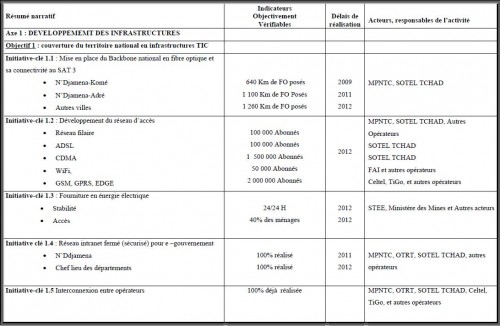Chad still on pace for ICT policy goals

Selected goals of Chad's NICI. Click to enlarge. {http://www.uneca.org/AISI/NICI/Chad/Plan%20NICI_Tchad.pdf}
ICT will in Chad, in the next twenty years, to better develop its human resources, economic and cultural, to reduce inequalities between citizens and help create a climate of peace, justice and democracy.” (Translated) – Plan de développement des Technologies de l’Information et de la Communication au Tchad
Low volumes of news information makes its way outside of Chad and most of what does is humanitarian or political in nature (think of the current floods in N’Djamena as an example). The government (ranked 3rd most corrupt in Africa by Transparency International) doesn’t directly own all Chadian media, but is thought to censor the private companies. However, SotelTchad, the historically state-run telecommunications provider, has done little to further mobile or broadband development.
In fact, Internet and mobile penetration are still very low:
- 6/2010: 1.8% Internet penetration (188,000 users out of a pop. of 10.5 million) which is still 3x higher than neighboring Central African Republic. {IWS}
- 2/2010: Mobile penetration estimated as low as 10% in Chad. {Internet & Democracy Blog}
Perhaps Sotel has been distracted with potential (but failed) privatization deals over the years. Still, despite accusations of corruption and inefficiency, Chad managed to propose a detailed national ICT plan in late 2007. The plan, similar to those of other African nations, proposed a series of collaborations between private and public sectors to meet an array of objectives by the end of 2012.
Recently, two major Internet-related stories have emerged from Chad:
- 11/2/10: Chad plans on increasing number of mobile subscribers from 100,000 to 1.8 million after, LAP Green Network, a Libyan state-owned firm bought a 60% stake in Sotel. An additional 20,000 fixed line subscribers are also on the to-do list. {Tripoli Post}
- 8/31/10: The first phase of the Central African Backbone project is planned to have landing station at Doba, thus linking Chad to the SAT-3 cable. {Telecom Paper}
Interestingly, the recently published expectations for the Central African Backbone project and the apparent Libyan telecom stake in Sotel both are consistent with Chad’s national ICT policy outline created in 2007. Hopefully the government will finally let go of majority control of the telecoms. However, when this transition occurs, the power grid will need to expand at the same rate as ICT demand. And on top of infrastructure, the government will need to convince the heavily agrarian society of the benefits from ICT.












 Twitter
Twitter Facebook
Facebook Pinterest
Pinterest
[…] year, we found Chad’s progress toward information access rather optimistic, observing that, “published expectations for the Central African […]
[…] This update was created by OAfrica.com and was last updated on 11/20/2010. Language: […]